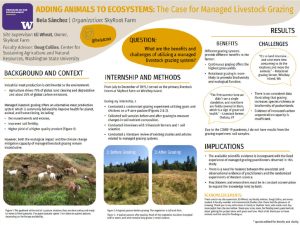Adding Animals To Ecosystems: The Case For Managed Livestock Grazing
Industrial meat production drives 15% of global carbon emissions and accounts for a significant portion of global land degradation. Rotational livestock grazing offers an alternative to commercial livestock production and promises improved health for the animal, the consumer, and the planet. The purpose of this study was to determine the ecological impact of rotationally grazing livestock and the benefit of utilizing rotational grazing on regenerative agriculture farms. Regenerative agriculture is described as farming and grazing practices that focus on mitigating climate change by building topsoil, increasing biodiversity, improving the water cycle, and strengthening the overall health of the farm ecosystem. Through a six-month internship at SkyRoot Farm, I conducted a randomized grazing experiment utilizing goats and sheep on a 9acre pasture in three different treatment conditions: no grazing, grazing with only goats, and grazing with goats and chickens. I supplemented the experiment with interviews with farmers practicing rotational grazing and a literature review of existing research on rotational grazing. The findings show that rotational grazing and continuous grazing each offer unique benefits to the farmer, but that rotational grazing improves degraded ecosystem function by increasing ecological biodiversity. However, the evidence of increased carbon sequestration capacity is insufficient. Ultimately, current grazing conventions will not be sufficient to mitigate climate change and ecosystem destruction. A paradigmatic shift in favor of ecological improvements rather than maximized profits is vital to sustaining the planet and the food system.
